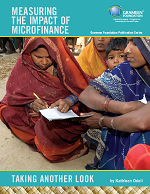Volunteerism: A New Business Model for Scaling Microfinance and Technology for Development
 This is not volunteerism for the sake of volunteerism, but rather a new business model for solving some of the real problems impeding the scale, sustainability, and impact of microfinance and T4D initiatives. A greater and more strategic use of volunteers can help the field to realize, more rapidly, strategic and operational improvements.
This is not volunteerism for the sake of volunteerism, but rather a new business model for solving some of the real problems impeding the scale, sustainability, and impact of microfinance and T4D initiatives. A greater and more strategic use of volunteers can help the field to realize, more rapidly, strategic and operational improvements.


 In Measuring the Impact of Microfinance: Taking Another Look, Odell examines studies which have demonstrated that microfinance helps poor people better cope with financial shocks that often upend their lives. It also addresses the difficulties in isolating microfinance’s impact from the myriad forces at play in poor people’s lives.
In Measuring the Impact of Microfinance: Taking Another Look, Odell examines studies which have demonstrated that microfinance helps poor people better cope with financial shocks that often upend their lives. It also addresses the difficulties in isolating microfinance’s impact from the myriad forces at play in poor people’s lives. Grameen Foundation has worked in Latin America and the Caribbean since 1999, focusing on the poorest people, living in remote rural areas.
Grameen Foundation has worked in Latin America and the Caribbean since 1999, focusing on the poorest people, living in remote rural areas.